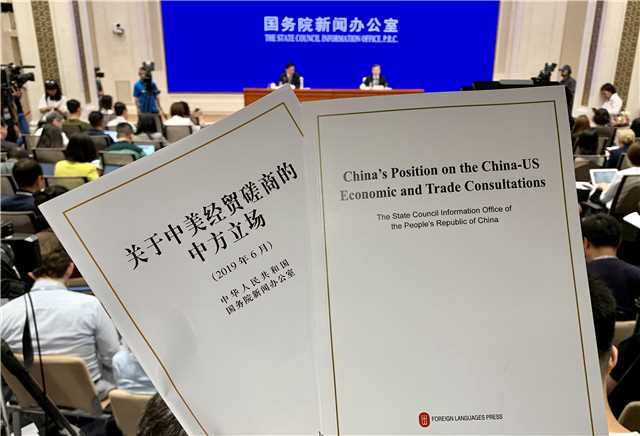America's sincerity in seeking a deal doubtful: China Daily editorial
China Daily | Updated: 2019-06-02 22:00

As China's White Paper on its trade negotiations with the United States, released on Sunday, shows, the US bears the full responsibility for the stalled trade talks since it is the one that has backtracked on its commitments-at least three times so far.
In early February last year, the two sides reached a consensus on their trade frictions, with China agreeing to import more agricultural and energy products. However, the US announced later that month it was imposing 25 percent tariffs on $50 billion worth of Chinese goods.
Talks in May then produced the consensus that they would not engage in a trade war, only for the US government to break that consensus 10 days later when it announced it would impose tariffs on more Chinese imports.
On Nov 1, 2018, the leaders of China and the US reached an important consensus that there would be no new tariffs and the two would hold more talks to solve bilateral economic and trade disputes.
However, in May, with an agreement lined up, the US government claimed China had reneged on its commitments and announced it would raise tariffs on $200 billion worth of imports from China and extend the tariffs to more Chinese goods.
Wang Shouwen, a vice-minister of commerce of China, said at a news conference on Sunday that the talks broke down because the US deliberately prevented the negotiations from producing a final deal by raising unrealistic demands concerning China's sovereign affairs in the last round of talks.
The US' strategy is thus crystal clear: First make unreasonable demands that it knows China cannot accept, then accuse China of causing the failure of the talks.
Such a way of handling the trade negotiations is a ploy used by the US to shirk its responsibility to talk in good faith and instead find new excuses to wage an economic war against China. It makes people wonder whether the US does seek to narrow its trade deficit with China as it claims or instead is seeking to suppress China's development.
While it remains uncertain that the US will undermine China's rise through wielding the baton of trade protectionism and victimizing Chinese enterprises, the dispute between the two countries has affected the growth prospects of the global economy.
The trade frictions have also raised production costs and retail prices in the US, reduced its economic output and jobs, and decreased its exports to China, according to various estimates by US-based institutes.
As the White Paper says, China will brave the headwinds and the US government won't be able to contain the country's development through its bullying.
























